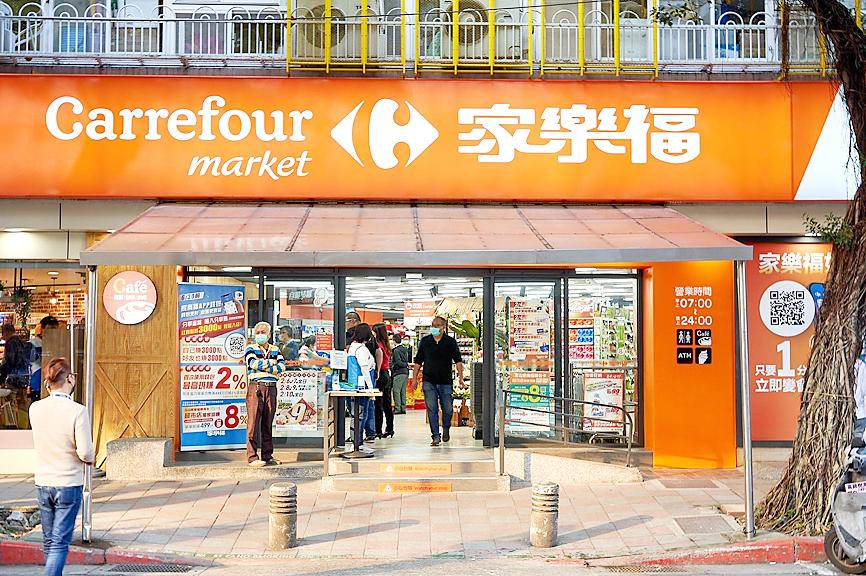The Carrefour SA hypermarket chain is under investigation after 11 trade associations filed a complaint accusing the retailer of passing the cost of stores it acquired in a merger last year on to its suppliers through “additional fees.”
The Fair Trade Commission (FTC) on Friday received a letter of complaint from 11 trade associations against Carrefour for demanding “additional fees” from suppliers, FTC Vice Chairman Andy Chen (陳志民) said yesterday.
A probe has been launched to see if there has been any misconduct, he said.

Photo courtesy of Carrefour Taiwan
“Additional fees are negotiable, but the rate should not be unreasonable or disproportionate,” Chen said.
It is not unprecedented for retailers to charge suppliers additional fees, but it is forbidden for them to charge disproportionate fees based on their advantage in the market, he said.
If found guilty of “obviously unfair conduct” as stipulated in Article 25 of the Fair Trade Act (公平交易法), Carrefour would face a fine of up to NT$25 million (US$875,595), the commission said.
The commission approved Carrefour’s merger application in December last year, allowing it to acquire 199 Wellcome Taiwan Co (惠康百貨) supermarkets and 25 Jasons Market Place premises across the country from Hong Kong-based Dairy Farm International Holdings (牛奶國際控股).
At the time, Carrefour said that the merger would benefit procurements, as it would be the owner of 353 outlets across Taiwan.
It began converting its 196 new stores in February with the aim of completing them in August.
Suppliers have accused the retailer of asking them to cover the store conversion costs by charging them “additional fees,” the Chinese-language Liberty Times (the Taipei Times’ sister newspaper) reported.
If Carrefour charged each of its approximately 3,000 suppliers NT$50,000 per store, it could obtain about NT$29.4 billion to convert the 196 new stores, it reported.
Carrefour has rejected the report, responding in a statement yesterday that it is “definitely impossible” for it to charge the suppliers such large fees.
The company said that it considers all of its suppliers to be important partners, and hopes to create more business opportunities for them by opening the new stores.
Carrefour said that it is still negotiating with suppliers about this year’s contracts.
If suppliers have concerns about their contracts, they should discuss them directly with the company, it said.

UNCERTAINTY: Innolux activated a stringent supply chain management mechanism, as it did during the COVID-19 pandemic, to ensure optimal inventory levels for customers Flat-panel display makers AUO Corp (友達) and Innolux Corp (群創) yesterday said that about 12 to 20 percent of their display business is at risk of potential US tariffs and that they would relocate production or shipment destinations to mitigate the levies’ effects. US tariffs would have a direct impact of US$200 million on AUO’s revenue, company chairman Paul Peng (彭雙浪) told reporters on the sidelines of the Touch Taiwan trade show in Taipei yesterday. That would make up about 12 percent of the company’s overall revenue. To cope with the tariff uncertainty, AUO plans to allocate its production to manufacturing facilities in

TAKING STOCK: A Taiwanese cookware firm in Vietnam urged customers to assess inventory or place orders early so shipments can reach the US while tariffs are paused Taiwanese businesses in Vietnam are exploring alternatives after the White House imposed a 46 percent import duty on Vietnamese goods, following US President Donald Trump’s announcement of “reciprocal” tariffs on the US’ trading partners. Lo Shih-liang (羅世良), chairman of Brico Industry Co (裕茂工業), a Taiwanese company that manufactures cast iron cookware and stove components in Vietnam, said that more than 40 percent of his business was tied to the US market, describing the constant US policy shifts as an emotional roller coaster. “I work during the day and stay up all night watching the news. I’ve been following US news until 3am

COLLABORATION: Given Taiwan’s key position in global supply chains, the US firm is discussing strategies with local partners and clients to deal with global uncertainties Advanced Micro Devices Inc (AMD) yesterday said it is meeting with local ecosystem partners, including Taiwan Semiconductor Manufacturing Co (TSMC, 台積電), to discuss strategies, including long-term manufacturing, to navigate uncertainties such as US tariffs, as Taiwan occupies an important position in global supply chains. AMD chief executive officer Lisa Su (蘇姿丰) told reporters that Taiwan is an important part of the chip designer’s ecosystem and she is discussing with partners and customers in Taiwan to forge strong collaborations on different areas during this critical period. AMD has just become the first artificial-intelligence (AI) server chip customer of TSMC to utilize its advanced

Six years ago, LVMH’s billionaire CEO Bernard Arnault and US President Donald Trump cut the blue ribbon on a factory in rural Texas that would make designer handbags for Louis Vuitton, one of the world’s best-known luxury brands. However, since the high-profile opening, the factory has faced a host of problems limiting production, 11 former Louis Vuitton employees said. The site has consistently ranked among the worst-performing for Louis Vuitton globally, “significantly” underperforming other facilities, said three former Louis Vuitton workers and a senior industry source, who cited internal rankings shared with staff. The plant’s problems — which have not